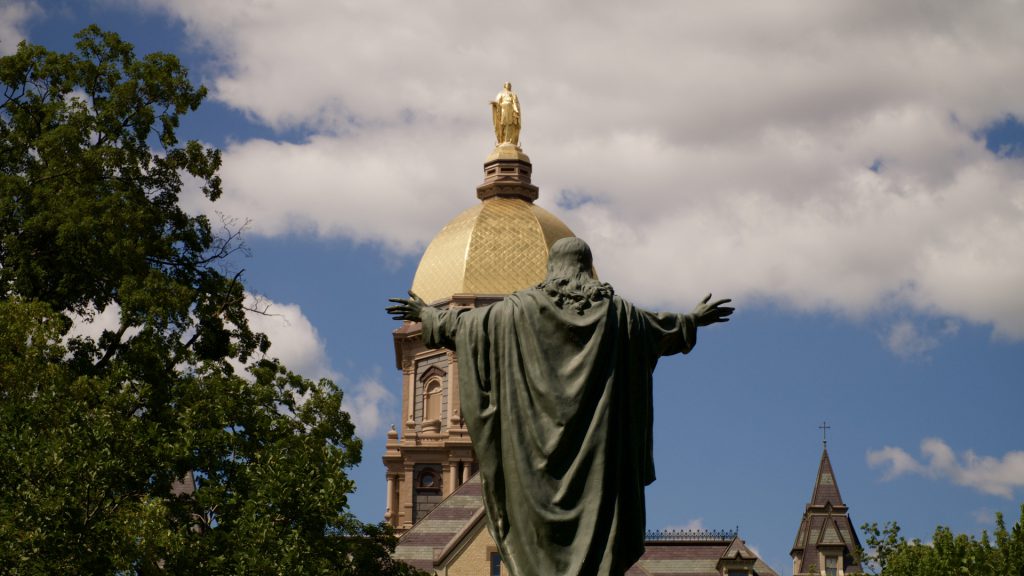
Published February 20, 2020
It has become all the rage on college campuses to affirm “gender diversity” and embrace the notion that children can decide for themselves where they might fall on the elusive “gender spectrum.” You might not expect to see this happen at a faithful Catholic university.
Maybe these days you should.
At my alma mater, the University of Notre Dame, the gender-studies program recently hosted a panel discussion entitled “Affirming Care for Gender Diverse Youth.” The panel featured four speakers, all of whom were affiliated in some fashion with Indiana University — and all of whom were entirely in agreement that boys can be girls, girls can be boys, and boys and girls can be something other than a boy or a girl, too.
According to an audio recording of the event that National Review obtained, all four speakers articulated the view that gender is “multidimensional and nonbinary,” as well as that young children must be permitted to assign their own gender and have that self-assignment reinforced by medical professionals, whether through counseling, puberty-blocking drugs, cosmetic surgeries, or some combination of the three.
“If you ask an average three-year-old, they will tell you . . . exactly who they are . . . because they know who they are,” said Dr. J. Dennis Fortenberry, who works with children and adolescents at Indiana University’s medical school and hospital. “What we take as gender-affirming approaches in our clinic is exactly that kind of perspective: A child tells you who they are. That’s who they are.”
This view went unchallenged and was echoed repeatedly by other members of the panel.
They were in agreement, too, that surgically altering children’s healthy body parts to accord with their self-conception is necessary in order to save their lives. “When we talk to insurance companies who say, ‘Well, this is all just cosmetic,’ I say this is saving these kids’ lives, and here are the data,” Fortenberry added.
Shockingly, he asserted that “there are no studies that show differently.” Though attendees at this event were none the wiser, thanks to the panel’s rigidly one-dimensional composition, this is simply not the case.
As one report from the Heritage Foundation notes, “the most thorough follow-up of sex-reassigned people — extending over 30 years and conducted in Sweden, where the culture is strongly supportive of the transgendered — documents their lifelong mental unrest.”
That study found that “ten to 15 years after surgical reassignment, the suicide rate of those who had undergone sex-reassignment surgery rose to 20 times that of comparable peers.” Reassignment surgery very well might be a matter of life or death. But it’s hardly the glowing success story touted at this event.
The “expert” panelists also declared that gender dysphoria “never goes away,” insisting that a child who experiences discomfort with his gender will struggle with that feeling for his entire life if left untreated (i.e., if not attacked with a barrage of drugs and surgery in a useless attempt to force his chromosomes to comply with his psychology).
Again, this assertion is contradicted by available evidence.
Eleven papers studying “desistance” in children — their tendency to grow out of gender dysphoria as time goes on — suggest that very few persist in wanting to transition by the time they reach adulthood. As our Madeleine Kearns noted when outlining these studies in a recent article: “It consistently appears that 80 percent of gender-confused children psychologically realign with their biological sex by young adulthood or sooner when supported through their natural puberty with non-invasive therapies such as watchful waiting.”
This reality is also evident in the countless stories of individuals who underwent some form of medical transition, only to desist later in life and experience profound regret, a phenomenon attacked and derided by transgender activists but documented in several places, perhaps most ably in Ryan T. Anderson’s book When Harry Became Sally: Responding to the Transgender Moment.
One of Notre Dame’s student newspapers reports that “several preemptive efforts were made” to ask university president Father John Jenkins and the College of Arts and Letters dean Sarah Mustillo either to cancel or postpone the panel. The same article notes that the university’s own guidelines suggest campus events should provide a forum “in which multiple viewpoints and voices on controversial topics can be heard, an appropriate balance among viewpoints is maintained, and, when a significant issue in the Catholic tradition is touched upon, that tradition should be presented.”
Evidently, the gender-studies department preferred to ignore this instruction, and the university saw no need to enforce it. Though Notre Dame remains in many ways a place where Catholic students can flourish, incidents such as this suggest that the university administration would rather risk the wrath of faithful Catholics than condemn the prevailing dogma of modern society.
There is no reason in the world why Notre Dame should, in the name of dialogue or any other secular value, provide a space free of challenge for progressive ideologues to promote pseudoscience about gender dysphoria in children. Not only does this ideology fly in the face of Catholic teaching about human nature and sexuality, but it also risks sowing further confusion and misinformation about biological reality, which can only cause further harm.
Alexandra DeSanctis is a staff writer for National Review and a visiting fellow at the Ethics and Public Policy Center.








